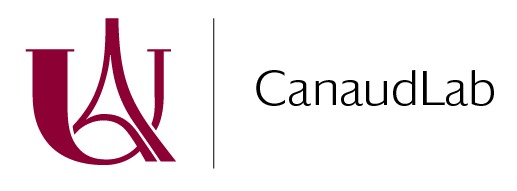All the news
Ma Thèse en 180s : Clémentine Marie est sélectionnée pour la finale nationale
The team participated to the “TOR de France”
In October 14-15, the team participated to the "TOR de France" conference. Guillaume Canaud delivered a lecture on new developments for PIK3CA-Related overgrowth spectrom and the team presented a poster on the Impact of PIK3CA Gain-of-function mutation in renal and...
Novartis announces findings from a real-world study of alpelisib demonstrating clinical benefit in people with PIK3CA-Related Overgrowth Spectrum (PROS)
PROS is a spectrum of rare disorders caused by PIK3CA mutations and is characterized by atypical, visible overgrowths and anomalies in blood vessels, the lymphatic system and other tissues At 24 weeks, 38% of patients achieved ≥20% reduction in the volume of the...
ESMO 2021 – Real-life data demonstrating the efficacy of alpelisib in dysharmonious hypergrowth syndromes (called PROS) linked to activating mutations of the PIK3CA pathway
The team of Professor Guillaume Canaud of the adult nephrology-renal transplantation department of the Necker-Enfants Malades AP-HP hospital, has been very involved for several years in the management of patients with dysharmonious hypergrowth syndrome (PIK3CA-Related...
New therapeutic perspectives for patients with lymphatic abnormalities linked to a mutation in the PIK3CA gene
The team from the adult nephrology-renal transplantation department of the Necker-Enfants Malades AP-HP hospital, Inserm and the University of Paris has carried out work, coordinated by Prof. Guillaume Canaud, which opens up new perspectives. therapies for patients...
GAGNA A. & Ch. VAN HECK PRIZE FOR INCURABLE DISEASES – 2021 LAUREATE
The "GAGNA A. & CH. VAN HECK PRIZE FOR INCURABLE DISEASES - 2021" has been awarded to Professor Guillaume CANAUD, from the Necker Hospital, University of Paris (France), for his contributions to the therapy of a spectrum of overgrowth syndromes characterized by...
The team is part of a new project!
PIPgen: a new Innovative Training Network to put PI3K/PTEN related diseases under the spotlight The PIPgen Training Programme seeks to train the next generation of PI3K/PTEN experts and envisions to empower PI3K/PTEN related disease research in Europe towards...
One, Two, Three !
The European Research Council awarded us a Grant for the thrid time! After "PAPAStudy - Podocyte Adaptation Proliferation and Ageing" (Starting Grant - GA n°679254), "CureTheCloves - PIK3CA inhibition in patients with the CLOVES syndrome" (Proof of Concept GA...
The team gets a brand new name!
The name of the lab is changing for this new one: "Mechanisms and therapeutic strategies in overgrowth syndromes and vascular anomalies."
Congratulations to Quitterie for the prize “Grandes Avancées Françaises en Biologie” from the Académie des Sciences!
On Tuesday, June 25, 2019, the Academy of Sciences invited young researchers / first authors, having contributed to major French scientific advances in biology, to present their results at the Institut de France. The Laureates were awarded with a medal and a prize of...
The #COSY project received 10 million euros!
The #COSY project (Cure Overgrowth SYndromes) will support fundamental research, drugs repositioning, creation of an OS department at Necker, development of new imaging modalities, state of the art genetic testing, 1st registry, promote socialization, education and...
Guillaume Canaud receives the Jean Hamburger 2018 Grand Prix de Médecine!
Guillaume Canaud receives the Jean Hamburger 2018 Grand Prix of Medicine from the City of Paris for the quality of his research and the major breakthrough on Cloves Syndrome. This prize, created in 1993, distinguishes a researcher aged under 45 who has made a...
The CLOVES Syndrome Community supports the Canaud Lab once again!
On February 27, 2019, the Canaud Lab received $20,000 from the CLOVES Syndrome Community for the creation of animal models to test PIK3CA inhibitors and to study PIK3CA related overgrowth physiopathology. We are thankful and ready to take action. Learn more about the...
The Canaud Lab received the Jean-Pierre Lecocq Prize!
On October 16 2018, the Canaud Lab was awarded with the Jean-Pierre Lecocq Prize from the French Academy of Sciences. Each year since 1992, this prize allocates 30 000 € for outstanding research projects in Applied and Fundamental sciences. Learn more about the French...
We thank the CLOVES Syndrome Community for their generous donation to the Canaud Lab!
In October 2018, the Canaud Lab received a donation from the CLOVES Syndrome Community. This donation will be used for the creation of animal models to test PIK3CA inhibitors. Learn more about the CLOVES Syndrome Community
Grant from the Simone and Cino Del Duca Foundation
In 2018, Guillaume Canaud received a grant from the Simone and Cino Del Duca Foundation. Three annual grants are intended for young French teams leading research projects in annually defined fields (chemistry, cellular and molecular biology, genomics, integrative...
Guillaume Canaud wins the 2017 “Institut Necker” prize from the Tourre Fondation
On March 5, 2018, Guillaume Canaud received the Institut Necker Prize during the annual ceremony of the Tourre Foundation, held at the Paris Descartes University, in the presence of a large audience. Since 2011, the Tourre Foundation has allocated a total of € 395,000...
Congratulation to Quitterie and all the team members!
Congratulation to Quitterie for her work on PIK3CA inhibition in patients with PIKC3CA Related Overgrowth Syndrome published in Nature! The team recently demonstrated the efficacy of a novel medication, a specific inhibitor called BYL719, in a cohort of 19 patients...
ERC Proof of Concept 2016 #CureTheCloves
Guillaume Canaud obtained a 2016 ERC Proof of Concept Grant entitled: CureTheCloves. Briefly, the Congenital Lipomatous Overgrowth, Vascular Malformations, Epidermal Nevi, Scoliosis/Skeletal and Spinal (CLOVES) syndrome is a genetic disorder due to a gain of function...
Congratulation to Marianne and Emilie for their works!
Congratulation to Marianne for her work on B7-1 blockade and post transplant nephrotic syndrome published in J Am Soc Nephrol! B7–1 Blockade Does Not Improve Post–Transplant Nephrotic Syndrome Caused by Recurrent FSGS Abstract FSGS is a common glomerular disorder that...
